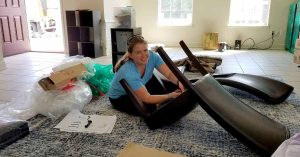Back in April, my husband left for six weeks, when I was just six weeks postpartum with a newborn, a one-year-old, and a four-year-old who were each a full-time job in their own ways.
This wasn’t just a six-week deployment — my husband fell off the face of the Earth for 42 days, with no communication whatsoever. It was mom-of-three baptism by fire for me, and while I was a frequent passenger on the struggle bus for that month and a half, I wanted to share a few things that helped make the task of solo parenting less daunting.
- Enlist help. A few months before my husband left, I pulled out a calendar and texted every family member and friend I knew would be willing to visit and help. Luckily, we are within driving distance from most friends and family. We were lucky to have people with us for all but two of the weeks my husband was gone. This not only helped me have the extra arms I so desperately needed but also the adult company I craved during the long days. Anticipating visitors also helped break up the weeks and give us new things to look forward to.
- Take shortcuts. Justify the things that you usually can’t, like paying for conveniences and little things that make your life easier… paper plates. Uncrustables. Lunchables. Pre-sliced fruit and prepackaged snacks. Pool baths. Curbside shopping. Those might be habits you want to break later, rather than letting them break the bank — but for now, take advantage of what is at your fingertips.
- Purchase some new entertainment. Before my husband left, I got online and purchased a few new toys and activities for the kids. Small things like little toy sets, sensory bin fillers, sticker books, etc. It is exciting for the kids to have some new entertainment to keep them busy and distracted (and out of your hair).
- Make a countdown paper chain. If you have young children, you know how difficult it is for them to understand the concept of time. Much to my surprise, our 22-month-old asked me every single day — for forty-two days straight, “Where is my daddy?” I thought she would forget about him after a short time, as it is often “out of sight, out of mind” for the one-year-old brain. My four-year-old son and I had a fun time making a paper chain together to count down the days until daddy came home. Each morning, the first thing he would do is run over and rip off one of the links. It was a great visual to help him conceptualize how much longer until his daddy was home.
- Keep a list of things to share with your spouse. When your spouse is off the grid with no ability to communicate, it can get overwhelming. The more time goes by, the more things you want to remember to tell him… current events, stories of your children, things that happened while he was away. Whenever my husband is away, I keep a list on my phone of things I want to tell him when he returns. I also text him a collection of things for him to catch up on when he gets home.
- Plan and prepare. Shortly before my husband left, I made a note on my phone of my plan for my daily routine and structure to break up our long days without him. Anyone who’s had a spouse gone for a period of time knows how long those afternoons and evenings get. I scheduled a walk after nap time, an hour of screen time in the evenings, and some sort of activity at the kitchen table to break up our mornings. I also made a list of rainy-day activities. This helps me not panic knowing if stuck indoors all day, I could pull out my list of fun activities to do with the kids. Examples include crafts, trampoline park, popsicle bath and cookie baking days.
- Pour into others. It can feel burdensome to serve others when your own little bubble feels like it might burst. Although it’s rewarding to be able to pour into others during your own struggles. I looked for small and manageable ways to help friends… gathering donations for a care package to be delivered for a friend who had a miscarriage, making a meal for a friend whose dad passed away, planning a baby shower for a friend (of course I planned for the actual shower to be after my husband returned), getting a babysitter and taking another solo-parenting mother friend of mine out for Mother’s Day brunch.
- Decide what things will give. Expectations are what will set you up for success or failure. Before your spouse leaves, set the expectation in your brain that you simply will not be able to maintain what you are able to do when your spouse is present. You will need to decide which things will give. For me, it was closing my Etsy shop, sticking my sourdough starter in the refrigerator, letting go of my daily makeup routine, and creating a simplified weekly cleaning checklist. Instead of my usual checklist with several items to do each day, I made a simple theme to stick to for each day of the week: Meal Prep Monday, Tidy Tuesday, Wipe-down Wednesday, Bathrooms Thursday and Floors Friday. The weekends were for laundry and planning meals and activities for the upcoming week. Creating simple weekly to-do lists helped me feel on track with maintaining a somewhat clean house, but also not overwhelming myself with an endless list of time-consuming tasks.
- Think about the future. Plan a family vacation. Think about your next weekend’s getaway. Research and plan fun things to do when your husband returns. I am usually all about living in the moment, but when your family is separated, it can be an appropriate time to live in the future here and there — to help get you through it.
These are all the things that helped me most during this recent military separation for my family. I hope they can be of help to you, too! These seasons of separation are the times for you to give yourself lots of grace, focus on the moments that go well — even if they are few and far between — and lean on others, even when it feels uncomfortable to do so.
Do not allow yourself to feel guilty in temporarily implementing things to make your life easier. In the end, it will make you a happier and more patient mother, which is all your children need and all your husband hopes to come home to.






Hello, my precious granddaughter is so much healthier in the care of her mother and family. When around her father she was exposed to toxic people and things that were making her sick and contributing to her already birth defects. They would take her funds from her medication programs for themselves and place anti government toxins in place. I personally always respond to all medication ads and apps because I know the proceeds are for her health and recovery and so appreciate all the wonderful opportunities that have been offered to her health and well being. So, just to say thank you for these programs and opportunities and support and love provided for Military families.
Hi Robyn, thank you for your kind words!